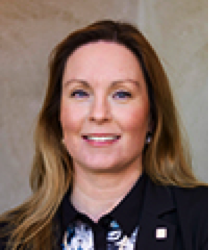Candidate Biographies

Maria Häll
Maria Häll is a Master of Science in Computer Science and, since February 2013, is the CEO of Sunet, the Swedish National Research and Education Network (NREN). Sunet is a branch of The Swedish Research Council.
Maria previously worked at the Government Offices of Sweden in the Ministry of Enterprise, Energy and Communications, in the division for IT Policy. Maria has extensive experience of working with ICT, broadband and Internet Policy issues, both in the private and public sectors, at local, national and international levels.
Maria has been Co-chair of the RIPE Cooperation Working Group and Vice Chair of the ICANN Government Advisory Committee (GAC).
Maria has also been Chair of the TU-Foundation Board. The TU-Foundation is the owner of the Swedish Internet Exchange company Netnod.
Board engagements:
- Member of the RIPE NCC Executive Board
- Chair of ISOC-SE, the Swedish ISOC Chapter
- The Swedish representative in the NORDUnet Board. NORDUnet is a joint collaboration by the five Nordic National Research and Education Networks
Motivation
I have a strong interest in a positive development of society and the role of technology as an important tool. I am especially passionate about the development of the Internet as a vital and global open infrastructure. And how collaboration between sectors on an equal footing is essential to fulfil this mission. This is an important theme throughout my different positions over many years.
My contributions:
- Experience of governments and politics on national and international arena
- Experience of the academic sector
- Bridging the gap between technical society, public sector and policymakers
- Creating good dialogue and cooperation between different actors
- I have a large network of persons and organisations all around the world
I have been engaged in the RIPE community for many years and I appreciate the good collaboration with the RIPE NCC. I am looking forward to continue to contribute with my experience and support the activities of the RIPE NCC, its members and the RIPE Community.

Christian Kaufmann
Christian studied Computer Science at the Georg-Simon-Ohm-Fachhochschule in Nuremberg and during his undergraduate years he started his own ISP and web design company. He holds a Master of Science in Advanced Networking at The Open University, which is the first of its kind in the world.
Christian had several consultant and network engineer roles for local ISPs before he moved on to managerial roles for international companies, including Technical Operations Manager for Cable & Wireless and GNOC Manager at Easynet. This led to an interest in peering and interconnection, and he transitioned to Global IP Peering Manager for TeliaSonera, where he managed the peering connections for a global transit-free network.
Simultaneously, he engaged himself in the community. For instance, he joined the AMS-IX Executive Board, where he served for six years, three of them as the Chairman, and co-founded FranceIX to which he came back last October and currently serves as the Chairman and President. He is also very active in the RIPE community, where he has attended every meeting for several years and also serves as a Co-Chair of the RIPE MAT WG. In the last six years, Christian served on the RIPE NCC Executive Board as Secretary. He introduced new processes and KPIs for the board and the management and also took on the responsibility to sponsor the RIPE Atlas and RIPE Database resiliency projects. Overall, Christian looks back on more than a decade of uninterrupted board experience in various organizations.
Currently, he is the Senior Director of Network Technology at Akamai Technologies, where he oversees the Engineering and Architecture for Akamai's Datacenter, Hardware and Networks. Akamai has graciously allowed him time to work on these community projects, and he has agreed to do the same for RIPE.
Motivation
Three years ago I promised the community to focus on three things:
- Improve the processes and communication between the RIPE NCC and the board.
I think we have a very good and productive relationship between the board and the RIPE NCC Senior Management, including defined and documented KPIs for the CEO, regular board meetings and offsite meetings. - To look into the RIPE Atlas project and to complete the RIPE Database resiliency project to ensure that the core services are always up and running.
The RIPE Atlas project is an established source of trusted info around the world and by now the costs of the expansion are paid through sponsoring. The RIPE Atlas project was also leading to a couple of successful and popular hackathons. The RIPE Database resiliency project is finished and we now have, where possible, a second side for our infrastructure. - I spend quite some time and effort in reaching out to other RIRs and fostering collaboration between us and them on both an RIR-to-RIR level and also on a board-to-board level.
I attended a large number of conferences and meetings in and outside of the RIPE NCC service region to talk to countless members about their views and needs in regards to the RIPE NCC. Especially the charging scheme and regional support were reoccurring topics.
Over the next three years, besides how to lower the membership fees☺, I want to focus on these three areas:
- Continue the collaboration with other RIRs - we are one global registry and the accuracy and stability of it concerns us all.
- How can the board itself improve and ensure that with the growing amount of members and the change of the member base we are still up for the job.
- In the world of Regulators, Internet Governance and their changing landscapes, trusted and neutral data is very important. The RIPE NCC already provides a lot of information via Whois, RIPEstat, RIPE Atlas, etc. I want to help to ensure our data is correct and we keep our neutral and trusted status.
Peter Sunde Kolmisoppi
Biography to be supplied

Piotr Strzyżewski
Background
I studied Computer Science at the Silesian University of Technology - one of the biggest technical universities in Poland. At the same time I started my job for the University Computer Centre as the system administrator. Since then I have changed position several times, finally becoming Manager of the Security and Network Operations Department. Although I'm mostly a security-oriented person, my team deals with all kind of things including but not limited to magic and miracles.
During my business career I have been given wide range of tasks that greatly exceed pure engineering. These have seen me involved with such areas as budgeting, legal advice or public tenders and policymaking.
For all those years I have been an active member of the PIONIER Consortium community (Polish NREN), involving many presentations and personal commitment with its task forces - IPv6-TF, PIONIER-CERT and PIONIER-PKI. I'm also a member of Abuse-Forum, an informal community of Anti-Abuse teams in Poland.
I was also one of the pioneers in deployment of the eduroam project in Poland, which is now one of the world's biggest world-wide roaming access services made for research and education users.
In the 1990s I was one of the core members of the Silesian Linux Users Group. Open ideas developed those days I hold till today. That's why I devote part of my time to promote "open knowledge". I do that in several ways, which include but are not limited to giving public lectures under the GNU/Politechnika (GNU/University) project. Moreover, I prepare and deliver many presentations at various meetings and conferences including PLNOG among others. Furthermore, since my knowledge about Linux and networks are a valuable asset I was asked to prepare and conduct lectures covering those subjects.
Since my primary occupation is University, this has given me the opportunity to better understand the point of view of research and education users, which are a huge part of our community. Nevertheless, I do have also experience in dealing with non-academic parties.
In my spare time I'm a yacht skipper. Although this is just a hobby, it has taught me how to effectively work in a team. I'm sure that this would allow me to be a better member of the Board.
Moreover, since many years, I'm also an active member of Mensa Poland association and last year I was elected to become a board member - development coordinator. This work gives me even more opportunity to learn how to deal with various needs of members of the community.
Work with RIPE and the RIPE NCC
I have dealt with all LIR-related topics since the late 1990s. This has aroused my interest in RIPE policies and community. The natural consequence of that was that I started attending RIPE Meetings in person more than 10 years ago. During this time I have made several presentations that touch on different areas, including policy proposals and implementation details.
Moreover, I have engaged myself and become a member of two Task Forces – the Anti-Abuse Contact Management Task Force and the RIPE NCC Charging Scheme Task Force.
In addition, for about 2 years I was one of the happy co-chairs of the RIPE Database Working Group, which has given me even more opportunity to serve RIPE community.
My work on the Charging Scheme Task Force has given me deep insight into details concerning financial aspects, the activity plan and budgeting of our association. Moreover, members of this Task Force have given valuable input into the process of creating crucial documents such as the Charging Scheme and Activity Plan.
Furthermore, I also manage LEGACY IP address space, which lets me be more oriented in the needs of this important part of our membership.
Motivation
I do believe that the important role of the RIPE NCC within the current Internet community is crucial. Its independence and impartial character brings stable support for the community not only within its service region but throughout the world.
The justification to increase the number of Executive Board members was, among others, to better reflect the changing composition of the RIPE NCC membership and to have more specialist knowledge available to the Executive Board to handle specific areas. I believe that my background, knowledge and experience would be a valuable asset for the Executive Board and will help fulfill those goals. My open-minded and creative style of thinking lets me better understand different points of view, which could be crucial for this role.
My goal is to serve the entire continuously growing community. I specifically would like to encourage more people from Central and Eastern Europe to engage more actively in the life of the community. To achieve that I would like to devote my spare time to work for the Executive Board. It would be a great honour to me if I were elected.
If you would like to have a chat with me, please catch me throughout the whole week of RIPE 74 Meeting.
LinkedIn profile.

Salam Yamout
Salam Yamout is the Regional Director, Middle East for the Internet Society since November 2016. Before that, she was the National ICT Strategy Coordinator at the Presidency of the Council of Ministers since July 2010, handling the EU, innovation, and ICT portfolios. Between 2005 and 2010, Salam worked for Cisco Systems where she was Program Manager for Corporate Social Responsibility. It was during her assignment as manager of the “Partnership for Lebanon” project that she set up the first Internet Exchange Point of Lebanon in 2008 (www.beirutix.net).
Salam holds an MBA from ESCP-EAP, Paris / Ecole Supérieure des Affaires, Beirut in 2005 and a M.S. in Electrical and Computer Engineering from the University of Arizona (Tucson, USA) in 1987.
She has been a professional in the field of Information and Communications Technology (ICT) for 25 years, and her work experience includes networking and telecommunications infrastructure; Oracle database administration; design and architecture of large IT systems; ERP implementation; procurement of IT systems; Internet governance; legal and regulatory aspects of ICT; and ICT public policy and planning. In short, she has managed and implemented technology-based solutions for the public and private sectors and society at large.
Salam is a social entrepreneur and volunteers her time to several NGOs and causes. She sits on the boards of Women in IT, Lebanese League of Women in Business, and MIT Enterprise Forum Arab Business Plan Competition. She also founded several organizations and initiatives in the past such as the Internet Society Lebanon Chapter, the Lebanese Internet Center, and the Lebanese Broadband Stakeholders Group.
Motivation
Three years ago, I had the privilege to be elected to the Executive Board of the RIPE NCC. During the last three years, I brought an independent and non-commercial perspective to the board. A perspective that proved valuable amidst the changing RIPE NCC environment of the post IANA transition.
While our values did not change, the way we communicate them and uphold them did. Our relationships with governments and other stakeholders were enhanced. Our transparent and accountable processes have been revisited to take us to a new level of responsibility.
Three years ago, I promised to strive and bring all stakeholders to the same level of appreciation for the Internet regardless of the economic and social development level of the country. In this area, the RIPE NCC has made significant strides by “going towards the members” in many different countries. In my region, the Middle East, MENOG is improving dramatically. MENOG 17 was very successful and drew nearly 200 attendees.
I also championed the “Good of the Internet” project and streamlined the various contributions of the RIPE NCC into a well-structured and documented program.